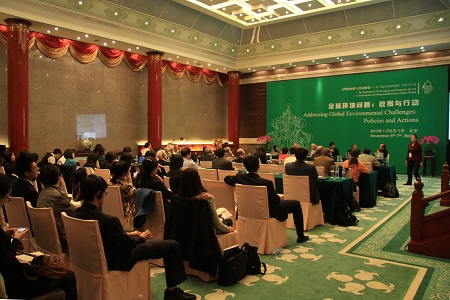Peking University, Nov. 5, 2010: The session one of the Panel Session of "Addressing Global Environmental Challenges: Policies and Actions" of the 2010 Beijing Forum was held at the Four Seasons Hall, Bafang Garden, Diaoyutai State Guest House on the afternoon of November 5. Scholars launched heated discussions and debates over issues related to the mitigation and adaption to climate change, the understanding of possible health effects that might be incurred by climate change, and the scientific certainty of climate change.

Panel Session of "Addressing Global Environmental Challenges: Policies and Actions" at the Four Seasons Hall, BaFang Garden, Diaoyutai State Guest House (PKU News (Chinese))
The first speaker, Prof. Zhu Tong form Peking University (PKU), delivered his speech titled "The Role of Megacities in Dealing with Climate Change and Air Pollution". He expressed that "megacities are the world economic engine, and rely heavily on energy supply", and "with intensive emissions of air pollutants and greenhouse gases, megacities influence the global environment through both air pollution and climate change." Prof. Zhu concluded that megacities were important places to realize the co-benefit of reducing health risks and abating greenhouse gases emission, which was supported by Prof. Carmichael from University of Iowa, who extended this idea to all short lived climate forcing agents. He stated that there was a great opportunity to cope with climate change by reducing the emission of short lived climate forcing agents, but there were challenges as well given a wide spectrum of the emission sources of these agents.
Besides, Prof. Zhu also expressed his concerns on the mutual reinforcement of air pollution and climate change. Increased atmospheric temperature accelerated the formation of secondary air pollutions like ozone and ozone itself was a climate warming agent, which was echoed by Prof. Wahner from Julich Research Centre. Prof. Wahner added that climate change increased the death rate in Europe in 2003 and about 1/3 of the deaths could be attributed to the climate-change-induced elevated ozone concentration. Meanwhile, he cautioned us on the possibility of creating another new problem by solving one problem, taking the example of diesel vehicles in Germany for example.
The interplay of regional air pollution, climate change, and the associated health effect was supplemented by Prof. He from Tsinghua University and Prof. Brunekreef from Utrecht University. Prof. He stressed the worsened air pollution in China as the increase of urbanization proceeds, city-clusters emerges, and vehicles. Prof. Brunekreef depicted the direct health effect of "global warming" by showing the coherence between elevated daily temperature and increased mortality. He also suggested that it was very challenging to establish a convincing epidemiological database as a basis for quantitative assessment of the impacts of climate change on health.
After the coffee break, Ding Yihui, a professor at the National Climate Centre, China Meteorological Administration, and also a member of Chinese Academy of Engineering, gave the lecture of "Scientific Discussions of the Global Climate Change". He admitted that there were disputes over the nature, causes, and consequences of climate change, but he believed that the impact of climate change on the water cycle was significant. As a result, the distribution of water resources in China was changed, so more flood in southern China and more droughts in northern China were observed. As an adaption strategy, the water transport engineering project was implemented to divert water from Yangtze River to the Yellow River in order to reduce the risk of water supply shortage in northern China.
Prof. Qian Weihong from PKU argued that the increased global average air temperature was normal climatic variations and human beings should not be held responsible for that. Other scientists disagreed and argued that human beings should take responsibility for climate change.
The following speaker, Prof. Robock from Rutgers University, who believed that the activities of human beings were causing climate change, alerted us the risks of injecting sulfate aerosol precursors into the stratosphere to counter global warming. He suggested that given all the uncertainties, risks, and benefits of adopting this strategy should be carefully checked and this strategy was not the substitution of the regular mitigation strategy of reducing greenhouse gas emissions.
Then Prof. Nakajima from University of Tokyo delivered us a speech on the complexity of air pollution and climate change, and the challenge in understanding the competing impact of the layer of air pollution over Asian and the global climate change. He called for constructing an efficient and sustainable earth observation system to unravel the myths we faced in the climate system.
After the lectures, these scholars answered the attendants' questions and carried out heated discussions.
Reported by: Zhang Hao
Edited by: Su Juan